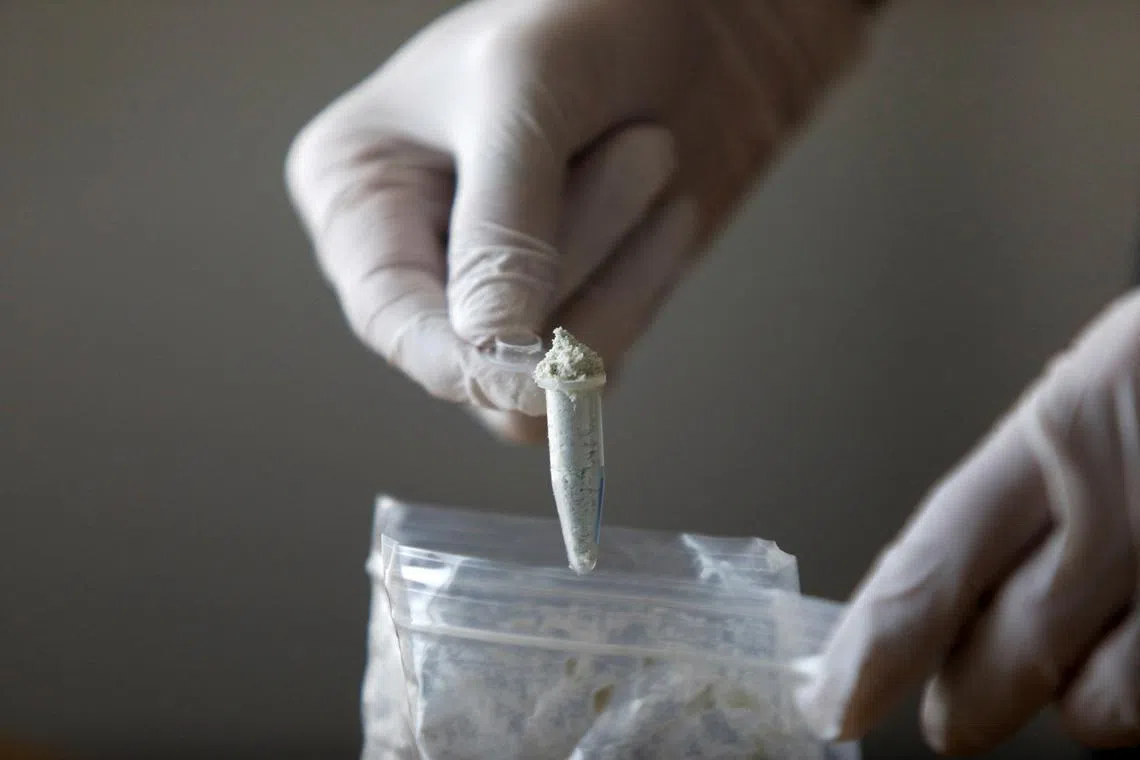Trump’s Canada, Mexico, China tariffs suspend loophole behind fentanyl shipments
Sign up now: Get insights on Asia's fast-moving developments

Overdoses of fentanyl, a powerful and addictive painkilling drug, killed nearly 75,000 Americans in 2023.
PHOTO: REUTERS
WASHINGTON - US President Donald Trump’s new tariff orders against Canada, Mexico and China all contain clauses suspending a duty-free exemption for low-value shipments below US$800 (S$1,095) that is widely seen as a loophole that has allowed shipments of fentanyl and its precursor chemicals into the US.
Staunching that flow was a primary motivation cited by Mr Trump in imposing sweeping import taxes on goods on the three largest US trading partners. Absent a fully global end to the so-called “de minimis” exemption, it is not clear how effective Mr Trump’s approach will be at curbing the flow of fentanyl.
The suspension of the exemption is due to last as long as Mr Trump’s tariffs are in place. It also could cause problems for Chinese e-commerce companies
Such small shipments often are not screened at ports of entry, allowing shipments of drugs and their ingredients to enter undetected. A Reuters investigation in 2024 revealed how Chinese chemical traders are using the de minimis exception to sneak shipments of precursors into the US, from where they are conveyed across the border to fentanyl labs in Mexico.
Overdoses of fentanyl, a powerful and addictive painkilling drug, killed nearly 75,000 Americans in 2023, according to the US Centres for Disease Control and Prevention.
In announcing the punitive duties of 25 per cent on goods from Canada and Mexico and an additional 10 per cent on Chinese imports, White House officials said on Feb 1 that the de minimis halt applied specifically to Canada. The officials criticised Canada for not cracking down on fentanyl trafficking shipments.
But the orders for all three countries contain the same language addressing the de minimis exemption: “For avoidance of doubt, duty-free de minimis treatment under 19 USC 1321 shall not be available for the articles described in subsection (a) of this section.” That subsection of each order broadly identifies the imports subject to tariffs.
Mr Trump's orders do not contain any language suggesting a global or permanent suspension of the de minimis status, leaving open the possibility that fentanyl shipments could still arrive unchecked as long as they do not originate from China, Canada or Mexico.
A White House spokesperson did not immediately respond to requests for comment on the exemption.
“These executive orders appear to eliminate de minimis entries for all three countries, which will have broad impacts on many businesses and industries,” said Mr Tim Brightbill, co-chair of Wiley Rein’s trade practice. “The de minimis provisions have been abused by a variety of importing industries – a problem well recognised by Congress as well as the current and prior administrations.”
While suppliers in China and criminal gangs in Mexico have been long accused of trafficking fentanyl into the US, Mr Trump’s tariff order against Canada included a long preamble saying that drug trafficking from Canada is growing.
“The challenges at our southern border are foremost in the public consciousness, but our northern border is not exempt from these issues,” the order reads. “Criminal networks are implicated in human trafficking and smuggling operations, enabling unvetted illegal migration across our northern border. There is also a growing presence of Mexican cartels operating fentanyl and nitazene synthesis labs in Canada.”
Nitazenes are similar to fentanyl.
The order added that drug trafficking via the de minimis exemption “has created a public health crisis in the United States”.
Shipments grow
De minimis shipments into the US have grown significantly since 2015, when the threshold for duty-free treatment was raised to US$800 per shipment from US$200 previously.
The US Customs and Border Protection agency now estimates that it process more than one billion such shipments a year, and Census Bureau data shows that estimated low-value shipments were the eighth-largest US import category from China at US$4.7 billion in 2023, more than doubling since 2014.
Former president Joe Biden’s administration in January issued last-minute proposed rules to curb the de minimis exemption globally, denying it to goods under other punitive tariff orders, and requiring shippers to identify the package contents by their 10-digit tariff codes.
It is unclear if Customs and Border Protection, now under Mr Trump’s direction, will act to finalise that rule. REUTERS


